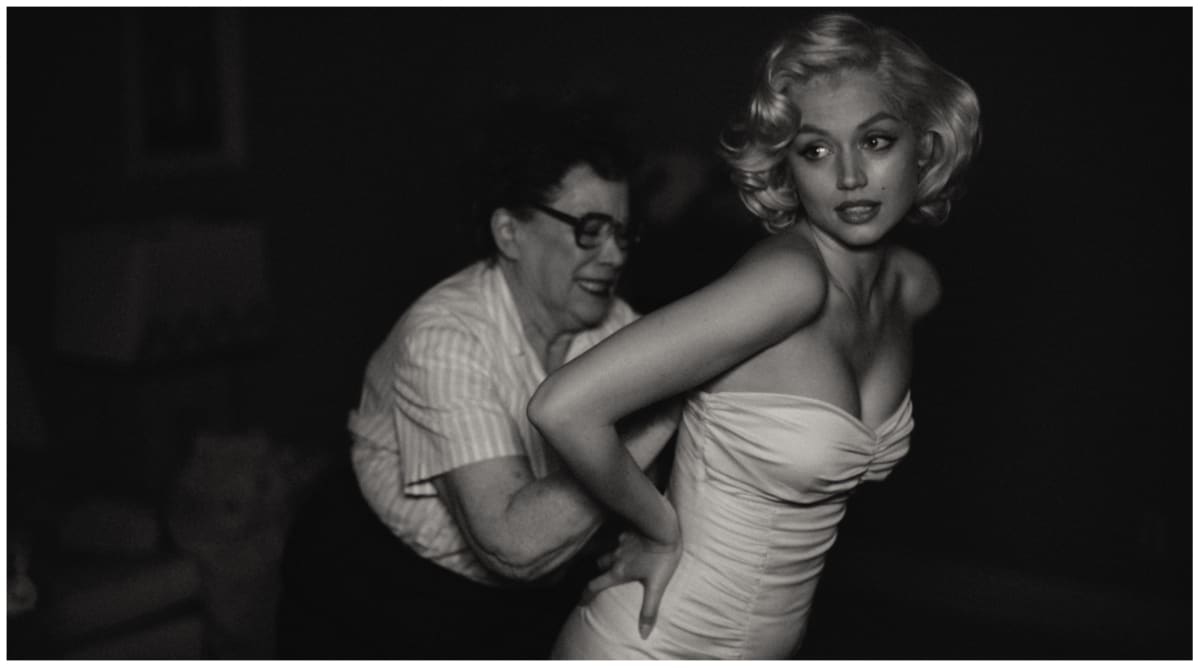Writer-director Aaron Sorkin often likes to describe his movies as paintings and not photographs. Facts, he seems to be saying like so many others before him, shouldn’t get in the way of a good story. But Blonde, director Andrew Dominik’s fragmented fable about the myth of Marilyn Monroe, is neither a painting nor a photograph — even though much of it looks like Life magazine stills come to… well, life. It’s a puzzle, and an abstract one at that. It’s a mood piece, a tone poem, and in a year that has given us the almost unbearable Elvis, it’s a feral shriek of dissent against formulaic Hollywood biopics.
But comparing the complex Blonde with something as self-parodic as Elvis would be doing a disservice to the film — Dominik’s second, or maybe even third, about the cost of celebrity and the fickleness of fame. Blonde shares several thematic similarities with the filmmaker’s 2007 classic The Assassination of Jesse James by the Coward Robert Ford. If that film was a meditation on stardom made to cosplay as a revisionist Western, Blonde is an examination of celebrity culture that channels the elevated horror films of Ari Aster and David Lynch. No one’s singing Happy Birthday Mr President here, although the president does get a… happy ending.

Forsaking plot in favour of mood, Dominik stitches together a tapestry of events from Marilyn’s life, beginning with her abusive childhood with an alcoholic mother, and transitioning to a series of encounters with men who ranged from outright abusive to moderately exploitative. Blonde is very much a #MeToo movie that presents Marilyn and her daddy issues as an archetype.
Dominik experiments with aspect ratios and film stock, colour and black and white, as he explores the two sides of his protagonist’s personality. And it takes a while to acclimatise to the film’s inhospitable temperature — it opens with a haunting sequence in which young Marilyn’s mother drives them directly into flames because she wants to see ‘hell up close’, and subsequently busies itself by subjecting Marilyn to a sustained series of nightmarish intrusions into her life. At one point, believe it or not, Dominik and his cinematographer Chayse Irvin’s camera places us directly inside her cervix. But later, they seemingly make up for it by having a drugged Marilyn puke directly on the lens, ostensibly on you and I.
This is a deliberately provocative movie, a nearly three-hour epic that tests the limits of endurance not just physically but also psychologically, and will probably offend audiences who go in expecting a more conventional experience. Determined to halt the generational trauma that she has inherited from her mother, Marilyn is conflicted between the desire to have a child and give it the life that she never had, and the fear that she might instead end up sentencing it to the one that she did. Dominik visualises her numerous pregnancies and terminations via expressionist CGI foetuses, floating in utero. It’s exactly as strange as it sounds, and another example of how the movie enters her personal space, this time by literally invading her body.
But this isn’t an exploitative movie. The perspective never shifts from Marilyn; the film never leaves her side. In moments that could be perceived as dehumanising, Dominik’s camera trains its focus on Marilyn’s face. He isn’t going to dignify the abuse by showing it on screen; he’s concerned only about what Marilyn is feeling, as he implores viewers to lock eyes with her and stay until the end. Practically speaking, there are only three instances in the film in which Marilyn appears to be genuinely happy. In the most memorable of these sequences, she frolics on the beach with playwright Arthur Miller — her third husband — and discovers that she is pregnant, as Nick Cave and the Bad Seeds swoon.
Dominik also reclaims some of the most iconic moments in Marilyn’s life from the perverts and the paparazzi that authored them. Pulling the curtain on that famous photograph of her in the white dress, the filmmaker reveals that it was staged as an open-air ogle-fest where thousands of frenzied men nearly trampled upon each other to catch a glimpse up her skirt. And then there’s the remarkable ending. Dominik gave Jesse James’ death an almost operatic sense of tragedy, but that was him indicting the actions of another man, the ‘coward’ Robert Ford. In Blonde, he is aware of his complicity. After spending over 150 minutes within inches of her face, he shoots Marilyn’s last moments from a respectful distance. The camera in the final shot gives the impression of being physically removed from its tripod and placed on the floor, as if the filmmaker is saying, “The show’s over. Go home now.”
Most Read 1Govinda started ‘rona-dhona’ about Salman Khan, Shah Rukh Khan, ‘ab ghar pe baitha hua hai’: Pahlaj Nihalani on torrid relationship with actor 2Jawan box office collection day 26: Shah Rukh Khan’s blockbuster refuses to slow down, nears Rs 1100 crore worldwide gross 3Show Rs 50,000-crore investment or apologise to Punjabis: Sukhbir Badal 4Asian Games 2023 Live Updates, Day 11: Gold for Jyothi-Ojas in archery; bronze in race walk as India cross 2018 medal tally for new all-time best 5Here’s state-wise list of fake universitiesRead more | Elvis: Baz Luhrmann’s bizarre biopic combines worst aspects of two terrible Indian blockbusters
And through all the indignities and the insecurities, Ana de Armas remains flawless. This isn’t merely a performance, it’s a possession. De Armas has somehow summoned the spirit of Marilyn Monroe herself to take control of her body, and the result is stunning. Her voice has that seductive breathlessness that could make your knees go weak, and the costumes and hair certainly add to the effect. But a great way to judge a performance is always through the moments in which the actor has nothing to work with — no co-stars, no lines, no drama. And in those moments of silence, de Armas is impossible to look away from. She makes the genius choice to play Marilyn like a Brothers Grimm heroine, trapped in a world filled with big bad wolves. An Oscar would be too insignificant an honour for what she has achieved here.
Salvation was always within sight for Marilyn Monroe, beyond the wall of salivating men. But it was never within reach. She chased it, she stalked it, she followed its every move, like a fan tailing an elusive celebrity. But she could never attain it.
Also ReadChithha movie review: Siddharth-starrer is a hard but affecting film on c…Chandramukhi 2 movie review: Kangana Ranaut, Raghava Lawrence’s mind-numb…The Swan movie review: Wes Anderson’s new Roald Dahl adaptation for Netfl…Dhoomam review: This Fahadh Faasil starrer gets completely lost in transl…
BlondeDirector – Andrew DominikCast – Ana de Armas, Adrien Brody, Bobby Cannavale, Xavier SamuelRating – 4.5/5
© IE Online Media Services Pvt Ltd



